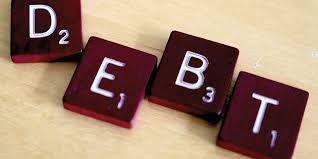Nigeria’s misplaced borrowing priority
The optimism of Buhari’s government when preparing its budget defies incredulity. It is, however, surpassed by the public’s inertia which goes along with the charade. This is one way to explain the failed revenue targets & increasing deficit financing since it assumed office on 29 May 2015. To be clear, there are benefits to running a fiscal deficit. Sadly, Nigeria’s situation isn’t one.
Fiscal expenditure is not tilted towards capital expenditure which this government continues to tout when justifying its borrowings. This government’s capital expenditure as a percentage of total expenditure has been, on average, about 21 percent from June 2015–June 2021 (the “term”). One is left underwhelmed with the capital expenditure items and implementation.
During this term, total fiscal deficit was approximately N26.2 trillion. Historically, Nigeria’s deficits were funded primarily by borrowing from the domestic debt market & by withdrawals from the excess crude account (ECA). ECA is no longer a viable option as the balance declined from US$2.4 billion as of 31 December 2015 to US$61.0 million as of 20 August 2021.
Consequently, fiscal deficits are being financed by borrowing from the domestic & foreign debt markets. This explains the growth in primary deficits& federal debt. Data from the Budget Office of the Federation shows that total debt service for the term was approximately N13.5 billion.
The arguments by Olivier Blanchard (2019) on public debt are not applicable to Nigeria, despite the best intentions of its monetary authority. Also, note that the advantages Japan has, as one of the most indebted countries, is that outstanding public debt is denominated in local currency &mostly held by domestic investors.
The Budget Office of the Federation planned to fund 85 percent of the 2021 supplementary budget deficit of N6.5 trillion with debt (domestic 36 percent, foreign 49 percent).
The balance to be covered by multi- & bi-lateral project tied loans and privatisation proceeds. This government’s statist stance is evident as sums from privatisation or proceeds of asset sales to fund burgeoning deficits, where considered, have been negligible.
This government refuses to consider unlocking its dead capital (residential real estate & agricultural land) as identified by PwC. Contrary to some opinions, this government does not have a spending problem. It has a revenue problem. The conscious & continuous reach for the debt lever indicates its lack of imagination in generating revenue or unlocking monetary value in the economy.
Read: How to stop diesel crisis from tipping Nigeria into another recession
Most observers are familiar with the nation’s debt profile in domestic currency. A less discussed topic is the composition of Nigeria’s external debt & the interest burden.
The obvious fact being that external debt is not payable with Naira. Nigeria’s total foreign debt increased from US$10.3 billion as of 30th June 2015to US$38.4 billion as of31st December 2021. During this period, multi- & bi-lateral loans decreased from 70 percent & 15 percent to 49 percent & 11 percent of total foreign debt, respectively. Eurobonds increased from 15 percent to 37 percent of foreign debt.
During this period, average interest rate on outstanding Eurobonds marginally increased from 6.1 percent to 7.3 percent. Based on the principal differential, US$38.4 billion less US$10.3 billion, the implied marginal interest expense on Eurobonds is US$337 million per annum.
This ex-post analysis serves to illustrate the expense capable of being incurred from increased commercial foreign borrowing at ever higher cost. It also excludes the 7-year US$1.25 billion paper priced at 8.375 percent which was issued on 17 March 2022. One assumes that the Nigerian treasury has cogent reasons for tapping the debt market under its global medium term note programme.
Data from the Debt Management Organisation (DMO) shows that external debt service (interest paid & principal repayment) increased from US$50 million in Q2 2015 to US$286 million in Q4 2021. For clarity, interest (& other charges) paid during this period increased from US$31 million to US$203 million, respectively.
Eurobonds account for 73 percent of the US$203 million interest expense. Principal repayment increased from US$19 million to US$83 million, respectively. Multi- & bi-lateral loans account for the entire principal repayment. The earliest maturing Eurobond, with a principal sum of US$300 million, is due on 27th June 2022.
The changing composition of external debt, with commercial debt dominating, will lead to increasing foreign exchange outflows for debt service.
It behoves the fiscal authority to keep its commercial debt investors sweet. Despite the multitude of risk disclosures in any bond prospectus, and collective action clauses, some investors, like hedge funds, have been known to be unrelenting when seeking repayments in the event of a default.
An IMF paper on indicators of external vulnerability (2000) noted that external debt-to-exports ratio is a useful indicator of trends in debt & repayment capacity. Debt-to-GDP ratio, the oft cited measure by policymakers, is a supplemental indicator that takes account of the potential for switching from production to exports.
Reinhart & Rogoff (2009) show an external debt-to-exports threshold of 30 percent–35 percent for developing countries when evaluating debt sustainability. It is a sad state where the officials tasked with monitoring public finance seem willfully blind to the undue burden placed on future generations. The role of the canary in the coalmine is often left to the likes of this writer & other conscionable analysts.








